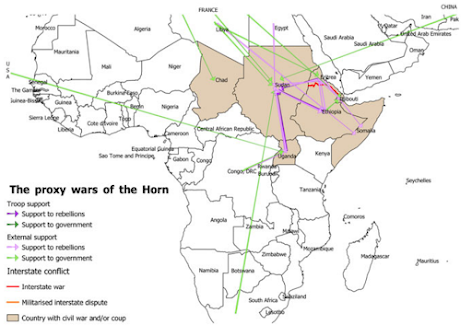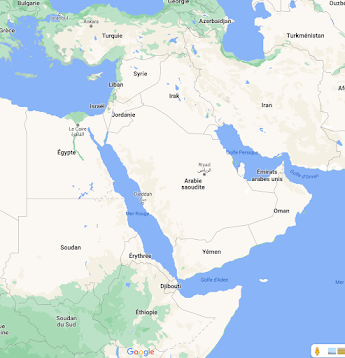6 - Proxy politics, Part 1: An Introduction
Hi everyone and welcome back to my blog! This post will mark the beginning of a new focus: ‘proxy politics’ in the Nile basin.
In the previous set of entries, I covered how the Grand Ethiopian Renaissance Dam has impacted the geopolitics of the Nile basin. The talks surrounding the project are currently facing a political deadlock. Therefore, the three countries involved (Egypt, Sudan, and Ethiopia) are looking for other options in order to break this stalemate and gain some negotiating power (Cascao et al. 2019). This is where ‘proxy politics’ comes in.
Proxy politics is a situation where an external country becomes involved in the internal politics of another nation in order to serve their own ambitions (Cascao et al. 2019). This often entails similar interests between the proxy and the patron. However, one can expect asymmetrical relationships between them as the latter is usually involved from a distance while all the risks fall on the former (Cascao et al. 2019). The patron’s support can take many forms, such as material, economic, political or diplomatic, as long as it contributes to ‘a change in the balance of power in favor of the patron’ (Brewer 2011).
The most common case of ‘proxy relationships’ is unfortunately ‘proxy wars.’ In this situation, the patron will side with one side of a war because it suits its interests. Therefore, a proxy war is ‘a conflict in which one party fights its adversary via another party rather than engaging that party in direct conflict’ (Brewer 2011, 137). Those interests can be multiple. For example, a patron can militarily support a proxy simply because the patron’s rival sides with the opposition. By providing logistical, technical or political backing, the external country serves its own interests (Cascao et al. 2019). In less extreme cases, ‘proxy relationships’ can simply take the form of foreign direct investment, for instance in the agricultural and irrigation sector.
Proxy politics and wars have a long history in the Nile basin and in the Horn of Africa. Some even say it is ‘as old as the Nile itself’ (Cascao et al. 2019). The most notable periods when proxy relationships were omnipresent are the colonial era and the Cold War, which still have repercussions today. Historically, the colonial powers have often been the most involved in the region. Indeed, France was the largest investor in Africa in 2020, and the UK was the 4th largest investor between 2016 and 2020, proving that former colonial powers still remain powerful in proxy relationships (EY Attractiveness Report 2020). Moreover, the superpowers during the Cold War heavily influenced the Nile Basin with proxy wars (Abbink 2003). Since then, the US kept its involvement with 401 projects in Africa between 2016 and 2020, the highest in the world (EY Attractiveness Report 2020).
However, historical powers are not the only ones involved in the Nile Basin with proxy relationships. Countries forming the BRICS, with China being the most talked about, also have their own interests in the region. China has invested over 70 US$b in the last four years (EY Attractiveness Report 2020). Funding for infrastructural development, especially in the hydraulic sector (for example in Sudan), formed a shift in international investment. ‘Today, Chinese companies and financiers have become involved in at least 220 dams in 50 countries’ (Bosshard 2009, 47).
But the patrons I will be most interested in in the next post are the nations of the Middle East. Thank you for reading!




wow - great post. I really like the expressly political focus - and wonder about the interrelation between proxy interests and the trade of virtual water
ReplyDeleteHi, thank you for your comment! Proxy interests and the trade of virtual water are deeply interrelated, especially for partons coming from water scarce countries. Therefore, the Middle East is a fascinating subject and I encourage you to read the next two blog posts as they go in more details on it.
Delete